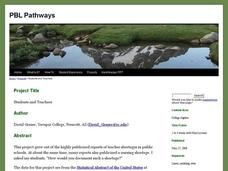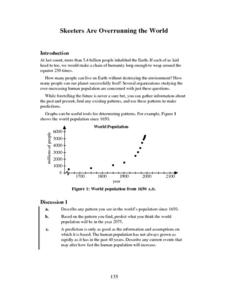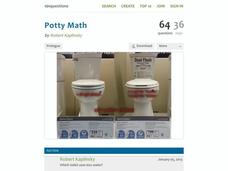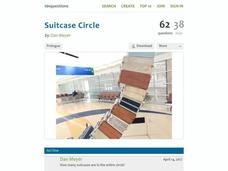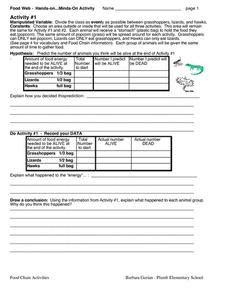DLTK
Groundhog Paper Craft
Get crafty this Groundhog's Day with a hands-on activity that combines creativity and making predictions. Scholars color, cut out, and put together a friendly image of a groundhog and showcase whether they feel the weather will be sunny...
PBL Pathways
Students and Teachers
Predict the future of education through a mathematical analysis. Using a project-based learning strategy, classes examine the pattern of student-to-teacher ratios over a period of years. Provided with the relevant data, learners create a...
101 Questions
Small Trebuchet
Travel back to medieval time where learning is just a stone's throw away! A video introduction shows a trebuchet (catapult-like machine) as it launches a rock into a lake. Learners use their quadratic modeling skills to predict the...
Tune Into English
Yellow Submarine – The Beatles – Notes
Enhance English language skills using the fan-favorite song, "Yellow Submarine" by The Beatles. Scholars predict what the song is about then listen and mark specific words they hear. Playing the song again, participants unscramble...
Novelinks
Touching Spirit Bear: Directed Reading Thinking Activity
What experiences lead people to change and how do they do it? After reading about Cole's encounter with Touching Spirit Bear, readers complete the second out of a series of five activities to predict future events in the text. The...
David Pleacher
Candy Math Fun
Few things can motivate children to learn like the promise of a sweet and tasty treat. Given a bag of M&M®s, Skittles®, or other colorful candy, students first predict the contents of the bag before counting the pieces,...
Annenberg Foundation
Skeeters Are Overrunning the World
Skeeters are used to model linear and exponential population growth in a wonderfully organized lesson plan including teachers' and students' notes, an assignment, graphs, tables, and equations. Filled with constant deep-reaching...
PBL Pathways
College Costs
Predict the year that college costs will double in your state using linear modeling. The first part of this two-part project based learning activity asks young mathematicians to use data from the College Board. They graph the data,...
UAF Geophysical Institute
Carbon Footprint
Your young environmentalists can calculate their carbon footprint and discuss ways to reduce it with a worksheet about climate change. After reading a handout about what impact one's carbon footprint can have on the environment, kids...
Serendip
Using Models to Understand Cellular Respiration
Energize biologists with colorful images in an activity that captivates the imagination while demystifying the subject of cellular respiration. Participants build comprehension skills and access core content knowledge by analyzing text...
It's About Time
Chemical Names and Formulas
Abracadabra! Provide your class with the tools to perform a chemical "magic show" as they predict the charges of various ions, determine ionic compound formulas, and make observations to determine when a chemical reaction between...
101 Questions
Potty Math
You don't want to flush your money down the drain! Have your classes complete a financial comparison between two different types of toilets. They use linear modeling to determine the most cost-effective model.
101 Questions
Suitcase Circle
Analyze patterns in a circular arrangement. After using a geometric construction to complete a circle, learners use proportional reasoning to make predictions. By determining the length of an arc built from suitcases, they estimate the...
101 Questions
Sticky Stickies
Don't let your classes get stuck on area calculations—grab their attention with an inquiry-based lesson! Scholars must develop a plan to determine how may sticky notes it takes to cover the surface of a door. They decide on the...
Howard Hughes Medical Institute
Color Variation Over Time in Rock Pocket Mouse Populations
While many mutations are neutral, those that appear advantageous increase in frequency in a population. Scholars use illustrations to make predictions about populations of mice. They follow it up with a video to confirm or refute their...
American Psychological Association
A Tasty Sample(r): Teaching about Sampling Using M&M’s
Here's a sweet activity! As part of a study of psychological research methods and statistic gathering, individuals develop a hypothesis about the number of each color of M&Ms in a fun-size package. They then count the number of each...
Curated OER
Food Chain Activities
Transform young biologists into grasshoppers, lizards, and hawks as you teach them about food chains in an interactive life science simulation. Working collaboratively to act out three different scenarios involving...
Teach Engineering
Density Column Lab - Part 2
Groups suspend objects within layers of liquids to determine the densities of different liquids and compare them to the densities of objects calculated in Part 1. The groups then carefully test their calculations by layering the...
Curated OER
The Metamorphosis: Herber Readiness Activity
Delve into Franz Kafka's The Metamorphosis before opening the book with a lesson on literary themes. High schoolers engage in a word association activity before reading a list of statements based on the book's...
Lesson Plansos
Guided Reading Activities with Pizzazz
Get the most out of your guided reading lessons with this collection of literacy materials. Offering a system for using color-coded tags to mark pages while reading books, as well as an assortment of comprehension and grammar...
National Christmas Tree Association
Merry Christmas, Geraldine
If you're reading the story "Merry Christmas, Geraldine" by Holly Keller, this is a fantastic cross-curricular resource to use. Complete with activities for language arts, science, social studies, art, and math, you'll get the most out...
Michigan Farm Bureau
The Little Red Hen
No one will be saying "Not I" with a lesson that combines The Little Red Hen with the life cycle of a wheat stem! After reading the story in your class, pass out wheat stems to your learners and have them examine the plants closely,...
Teach Engineering
Earthquakes Living Lab: Geology and the 1906 San Francisco Earthquake
We can learn from the past to protect the future. Pairs look at two historical earthquakes: San Francisco, Calif., and Kobe, Japan. Pupils compare the two earthquakes and their impacts, then determine how engineers may use the...
Science Matters
Formative Assessment #2
Learners work collaboratively to predict what life would be like as an Arctic Hare. Teams go on a hunt where scholars role play an owl, white hares, and gray hares. Independently, pupils record their findings and reflect on their...

